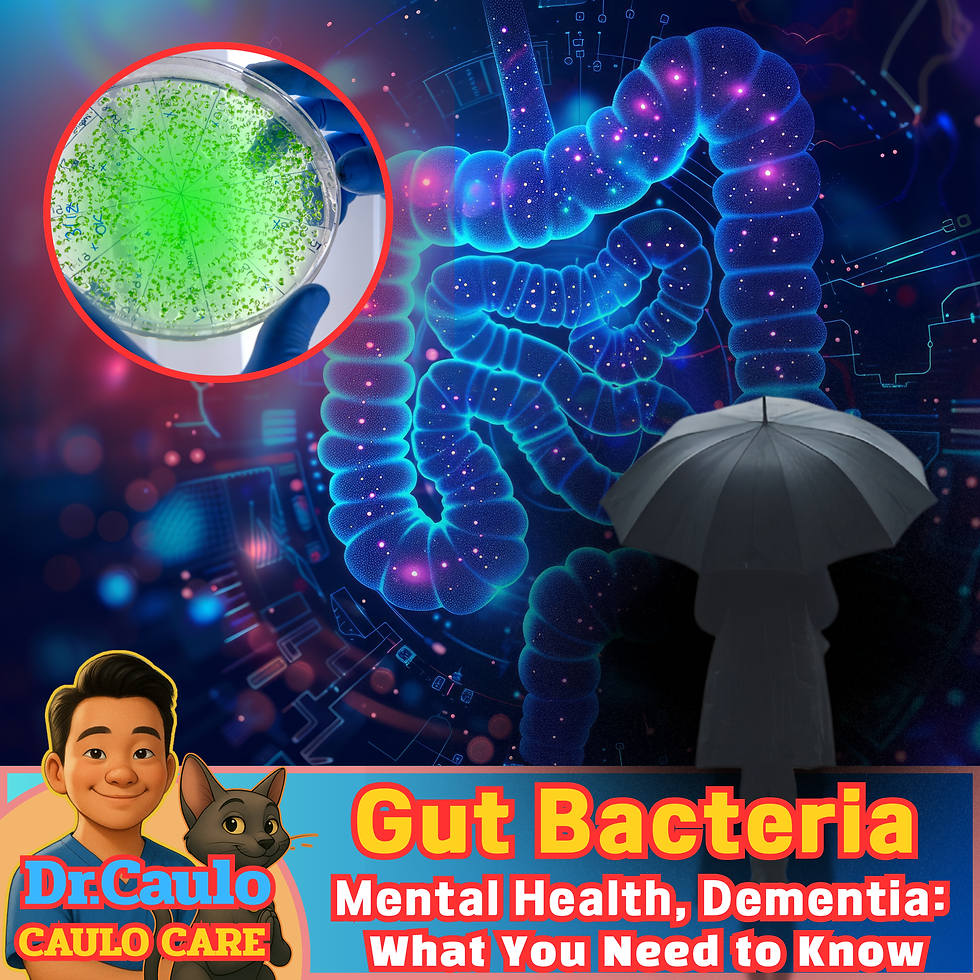Understanding the Distinctions Between Probiotics and Prebiotics in Modern and Traditional Chinese Medicine
- caulocare
- May 7, 2025
- 4 min read

In the quest for optimal gut health, probiotics and prebiotics have gained significant attention. These two components play crucial roles in maintaining a healthy digestive system, yet they have different functions. Understanding their distinctions can help you make better dietary choices, leading to improved overall well-being.
This post explores the definitions and functions of probiotics and prebiotics through both modern medical and Traditional Chinese Medicine (TCM) perspectives.
What Are Probiotics?
Probiotics are live beneficial bacteria that support gut health. These "friendly microbes" contribute to various essential bodily functions such as digestion, immune response, and maintaining the balance of the gut environment.
Sources of Probiotics
Probiotics can be found in several fermented foods, including:
Yogurt: Approximately 50 billion live cultures in a serving of yogurt can improve digestive health.
Kefir: This drink contains over 30 different strains of bacteria.
Kimchi: A fermented vegetable dish that provides beneficial bacteria and aids digestion.
Kombucha: This fizzy beverage has about 1 billion probiotics in a typical serving.
Miso: A fermented soybean paste that's a great source of probiotics.
Tempeh: Fermented soybeans that not only provide probiotics but also protein.
Probiotic capsules: Over 70 billion CFUs (colony-forming units) in some high-quality supplements.
Role of Probiotics
The primary roles of probiotics include:
Fighting Harmful Bacteria: Probiotics help keep harmful bacteria in check, which can reduce the risk of diseases and gastrointestinal issues.
Boosting Immune Response: Probiotics can enhance your immune system, making your body more effective against infections.
Producing Vitamins: They aid in producing vital vitamins like B12 and K2, contributing to overall health.
In simple terms, think of probiotics as defenders of your digestive system, keeping it healthy and resilient.
What Are Prebiotics?
Prebiotics are non-digestible fibers that act as food for probiotics. They are essential for a healthy gut microbiome, as they nourish the beneficial bacteria that contribute to your digestive health.
Sources of Prebiotics
You can find prebiotics in various fiber-rich foods, including:
Garlic: Contains inulin, a type of fiber that supports gut health.
Onion: Rich in fructooligosaccharides, which fuel good bacteria.
Banana: Contains resistant starch, beneficial for digestive health.
Asparagus: Another great source of inulin that encourages healthy bacteria growth.
Oats: A fiber-rich breakfast choice that feeds probiotics in your gut.
Apple skin: High in fiber and antioxidants that nourish gut flora.
Role of Prebiotics
The main functions of prebiotics include:
Supporting Good Bacterial Growth: By nourishing probiotics, prebiotics ensure that beneficial bacteria can thrive and multiply in the gut.
Improving Bowel Movements: They can enhance regularity and promote overall digestive health, helping to reduce issues like constipation.
Reducing Inflammation: Prebiotics can help lessen gut inflammation, which is linked to several digestive disorders.
In essence, prebiotics are the fuel that keeps your gut's "defenders" strong and ready to act.
Modern Medicine Perspective
Modern medicine recognizes the specific functions of probiotics and prebiotics, illustrating how these components complement each other effectively.
Probiotics as Good Bacteria
Probiotics are classified as beneficial bacteria that play vital roles in digestion and immune support. Studies indicate that maintaining a healthy balance of probiotics can decrease the incidence of gastrointestinal disorders by up to 40%. A lack of these beneficial bacteria can lead to issues like irritable bowel syndrome (IBS) and weakened immune function.
Prebiotics as Probiotic Fuel
Prebiotics are identified as essential fibers that nourish probiotics. For instance, a diet lacking in prebiotics can reduce the population of beneficial bacteria by up to 80%. This highlights the importance of consuming a balanced diet rich in both probiotics and prebiotics.
Traditional Chinese Medicine Perspective
In Traditional Chinese Medicine, gut health is viewed through a different lens, focusing on energy balance and bodily functions.
Probiotics as Qi-Boosting Energy
In TCM, probiotics are seen as contributing to the body's Zheng Qi (righteous energy). A balanced gut is viewed as essential for supporting the Spleen and Stomach, which are believed to regulate digestion and energy production.
Prebiotics as Yin-Nourishing Substances
Prebiotics, in TCM, are seen as Yin-nourishing foods that help combat dampness and promote healthier bowel movements. Foods high in fiber, such as beans and whole grains, are particularly encouraged.
For example, warm, fiber-rich foods like cooked sweet potatoes and pumpkin are often recommended for their digestive benefits and their ability to prevent stagnation.
In TCM, balanced digestion enhances energy levels, underscoring the need for both probiotics and prebiotics for overall health.
Key Takeaway
Understanding the differences and interdependent roles of probiotics and prebiotics can equip you for a healthier gut.
Modern View:
Probiotics: Promote digestion and immune health.
Prebiotics: Nourish probiotics and improve digestive regularity.
TCM View:
Probiotics: Energize your body and defend against pathogens.
Prebiotics: Nourish your system and support digestive functions.
To cultivate a thriving gut, prioritizing both probiotics and prebiotics in your diet is essential. Whether considered through the perspectives of modern medicine or Traditional Chinese Medicine, they are vital components of a healthy digestive system. Be proactive in feeding your gut and enhancing your overall well-being.
By blending probiotics and prebiotics into your meals, you are making a positive step toward greater gut health. This relationship between your diet and gut function is crucial. As you try new foods and explore ways to boost your gut health, remember that this journey is worthwhile. Embrace the "dynamic duo" within your digestive system—care for your gut to invigorate your health!
This information is only educational and should not be construed as medical advice.
Everything must be balanced, and the suggestions may not apply to you.
A specialist doctor should be consulted for any medical advice or diagnosis.
BOOK AN APPOINTMENT NOW!
Acupuncture near me at Forest Hill, NY
🔶🔷🔶🔷🔶🔷🔶🔷🔶🔷🔶🔷
Dr. Phumlarp Caulo LA,c, MAc. OM, DAHM
Doctor of Acupuncture/Chinese Medicine
Caulo Care Acupuncture
🔖 By appointment only
☎️+1 (929) 269-4549




Comments